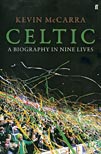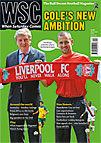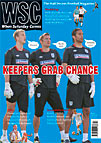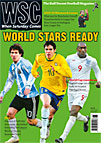 A biography in nine lives
A biography in nine lives
by Kevin McCarra
Faber & Faber, £16.99
Reviewed by Mark Poole
From WSC 304 June 2012
Buy this book
Most club histories are too dry. Anything but the longest book can only scrape the surface of over a century in the life of an institution that means so much to so many people. Presumably that problem inspired the format of Kevin McCarra’s biography of Celtic. Choosing to structure the book around the lives of eight key men in Celtic’s history – and the relatively unheralded Flax Flaherty – lets him examine the soul of a club that he describes, in the first line of his introduction, as like no other.
It is a line that would irritate most fans of other Scottish teams, but it is one he immediately justifies in his description of the remarkable mass-migration of fans to Seville for the UEFA Cup final in 2003. McCarra is not shy to praise Celtic where he sees fit: the 1967 European Cup victory, Seville, and Fergus McCann and Martin O’Neill re-establishing the club as Rangers’ equals off and on the pitch. He is equally clear about his opinions on fans who romanticise the IRA or wallow in persecution complexes. Perhaps his absence from Scotland helps him discuss Scottish football objectively without worrying about how his opinions will be received.
The “nine lives” structure lends the book more depth than the majority of club histories, but McCarra does not let that restrict him from going beyond each of his subjects to cover other ground. The result, particularly in the early chapters, is like the pleasant reminiscences of a benevolent grandfather.
Among other things, the Jock Stein chapter is a reminder of how limited Celtic’s resources were when they won the European Cup in 1967. Has any other club ever paraded that trophy on a lorry they have borrowed from a builder? The McCann chapter reads like an extended love letter to the man who enabled Celtic to realise their potential. Great anecdotes and facts are scattered throughout.
In spite of the structure, McCarra seems to feel obliged to provide a full history of the club. This can be a slight disappointment at times, particularly in the chapter on Flaherty, the newspaper seller who was also Jock Stein’s best friend. Flaherty brought the players their papers each day and his relationship with the club was so close that he regularly accom- panied the club secretary, Irene McDonald, to pick up the players’ wages from the bank. This relationship reflects a time, particularly in Glasgow, when clubs were tied closely to their local communities. The prospect of this chapter was intriguing, but it left Flaherty behind and moved on far too soon.
The book is not perfect, but it comes far closer than most to capturing the essence of the club. As a supplementary book for those already well served with Celtic literature, it is worth a look. For those starting out on their Celtic library, it is a must-buy. Mark Poole
Buy this book
 Despite recent problems at both Rangers and Celtic, Glasgow's dominance of Scottish football is unlikely to change soon. Neil White explains
Despite recent problems at both Rangers and Celtic, Glasgow's dominance of Scottish football is unlikely to change soon. Neil White explains

 A biography in nine lives
A biography in nine lives